The Zaporizhzhia Journalists’ Solidarity Center (JSC) of the National Union of Journalists of Ukraine (NUJU), fulfilling its main function – to help media representatives working in the region during the war, does not leave out the newsrooms of newspapers and online media, which also need support. In the front-line region, 70% of which is occupied, this is very important. That is why the Center launched the project called Local Media: Creative Achievements, Problems, Prospects.
The war literally erased a lot of popular media from the media map of the Zaporizhzhia Region. Some of them ended up in the temporarily occupied part of the region. They were forced to announce the closure of their media, and publications from the front-line territories moved to Zaporizhzhia. Internet media RIA.Pivden continued its work in the regional center, and with the help of the NUJU and foreign partners, two local newspapers resumed their publishing.
Zaporizhzhia TV channels were less “lucky.” Television broadcasting is a very expensive thing; therefore, in the absence of sponsors, TV channel Alex disappeared from the air, and the same fate befell TV5 – the most popular and widespread TV channel in the Zaporizhzhia Region. However, journalists did not agree with this perspective and created a new broadcasting format on YouTube based on it. Dmytro Zlochevskyi, the editor-in-chief of the former TV channel, and now Piyata Redaktsiya, created on its basis, told the local media at a meeting at the JSC of the NUJU.
“We kept the best of what was developed over the years and is popular with viewers, expanded information broadcasting with reports from the front and the front-line territories, started the discussion columns Vholos, Rastolkuy (directed to the occupied territories on the rush, russians to explain to make them think about what is happening). We also prepare cringe news, news “from a mental house,” and from the occupation. We also conduct a very interesting project called Steel Warriors. These are meetings and conversations with soldiers, with commanders in the dugouts and in the studio. All journalists have the accreditation; we travel to the front and near-front territories. And here I would like to take this opportunity to thank the Journalists’ Solidarity Center for providing two sets of protective equipment and first aid kits. They have very reliable and comfortable body armor and helmets; I have worked in them more than once. Also, they provided a cool first aid kit. Thank God we haven’t needed it yet,” Dmytro Zlochevskyi noted.
The editor-in-chief of Piyata Redaktsiya, who, in order to stay afloat under conditions of limited financial resources, had to significantly reduce the creative team, intensified the creative process as much as possible when everyone works for several when everyone acts as a well-established mechanism.
“We publish 40-50 minutes of original, interesting content every week. We see that we are watched both in Ukraine and in russia, and we have a lot of feedback. To be honest, work is much more difficult than when the TV channel was full-fledged. But this regime keeps us in good shape. We understand that it is not easy for everyone now, and our work on the information front is extremely necessary. That’s why we keep working, fighting,” noted the editor-in-chief.
Speaking about the problems that complicate the work of the newsroom, Dmytro Zlochevskyi noted that the main one, in his opinion, is the lack of qualified staff. Online education has greatly weakened the training of specialists. And the newsrooms, which currently work practically from scratch and with a smaller number of specialists, do not have the opportunity to train and “train” specialists for themselves.
According to the editor-in-chief, it would be very appropriate if donors working in the field of supporting Ukrainian media started grant or planned support programs for the training of journalist personnel. In particular, it seems very appropriate to provide material support for the practice of journalist students in newsrooms.
“Currently, contributing to the development of Ukrainian media means contributing to freedom of speech, democracy, and victory,” says Dmytro Zlochevskyi.
Journalists asked the head of Piyata Redaktsiya many questions and expressed their opinions and suggestions regarding topics and programs that could diversify television content. It was a creative professional conversation that benefited both parties. Along with local media workers and displaced journalists, future journalists were also present at the meeting. One of them is Tymur Semeniuk, a graduate of the Grani educational television studio.
“I once again became convinced that journalism is a profession in which you must be ready to work in any conditions; only under such conditions can it be interesting and in demand. Piyata Redaktsiya found its place even in such difficult conditions because real professionals and creative and caring people work there. I once again made sure that I had chosen the right path. I will be a journalist,” noted Tymur Semeniuk.
Call the Zaporizhzhia JSC at 096 277 5352 (Nataliya Kuzmenko and Valentyna Manzhura, the Zaporizhzhia JSC coordinators). The Center’s address is 152 Sobornyi Avenue.
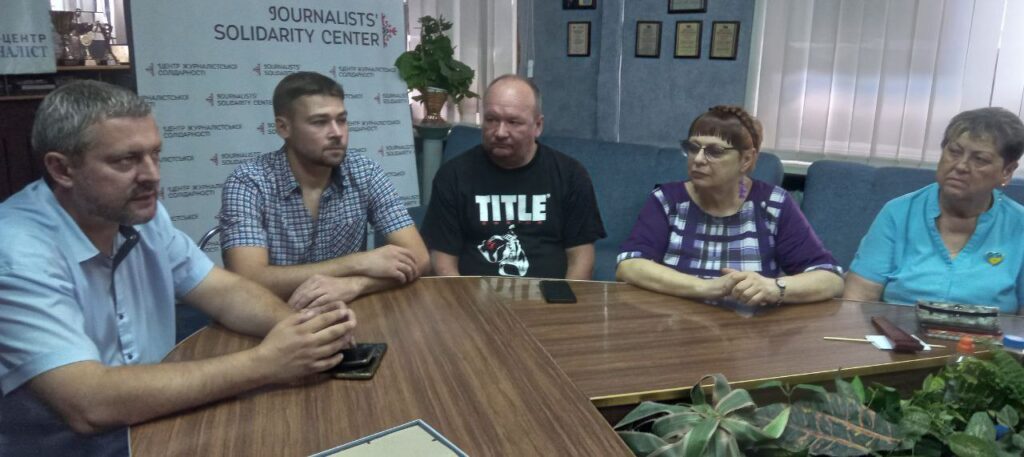
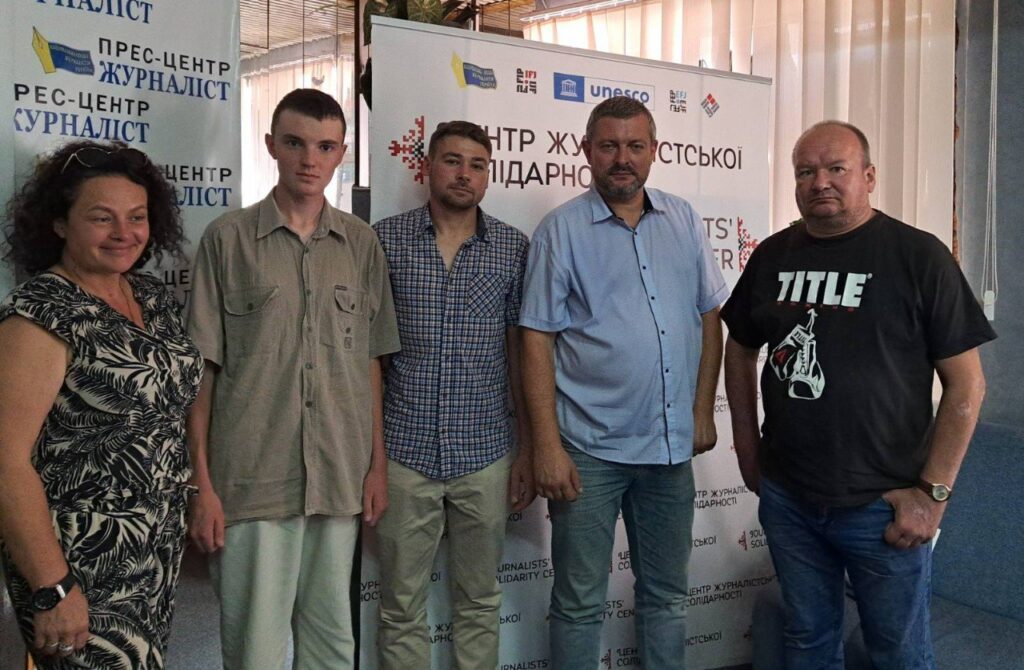
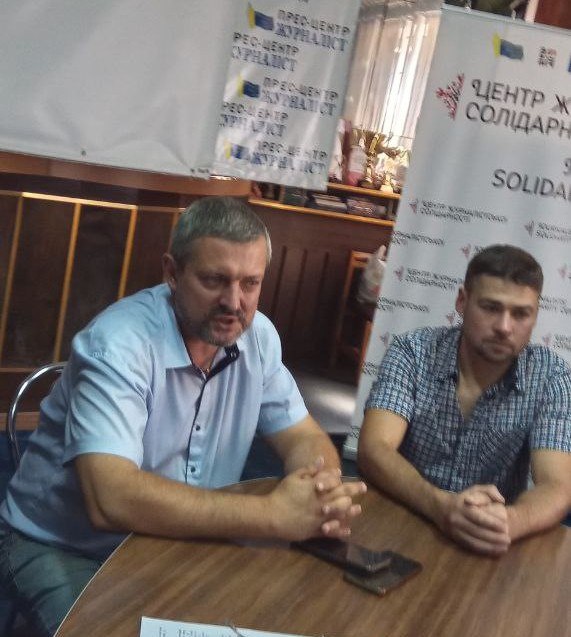
ABOUT JSC
The Journalists’ Solidarity Centers is an initiative of the NUJU implemented with the support of the International and European Federations of Journalists and UNESCO. The initiative is designated to help media representatives working in Ukraine during the war. The Centers operate in Kyiv, Lviv, Ivano-Frankivsk, Chernivtsi, Zaporizhzhia, and Dnipro and provide journalists with organizational, technical, legal, psychological, and other types of assistance.
ABOUT UNESCO
UNESCO is the United Nations Educational, Scientific, and Cultural Organization. It contributes to peace and security by promoting international cooperation in education, sciences, culture, communication, and information. UNESCO promotes knowledge sharing and the free flow of ideas to accelerate mutual understanding. It is the coordinator of the UN Action Plan on the Safety of Journalists and the Issue of Impunity, which aims to create a free and safe environment for journalists and media workers, thus strengthening peace, democracy, and sustainable development worldwide. UNESCO is working closely with its partner organizations in Ukraine to provide support to journalists on the ground.
The designations employed and the presentation of material throughout this digest do not imply the expression of any opinion whatsoever on the part of UNESCO concerning the legal status of any country, territory, city, or area or its authorities or concerning the delimitation of its frontiers or boundaries.
The authors are responsible for the choice and the presentation of the facts contained in this digest and for the opinions expressed therein, which are not necessarily those of UNESCO and do not commit to the organization.
Valentyna Bystrova
Photo by Dariya Zyrianova

 THE NATIONAL UNION OF
JOURNALISTS OF UKRAINE
THE NATIONAL UNION OF
JOURNALISTS OF UKRAINE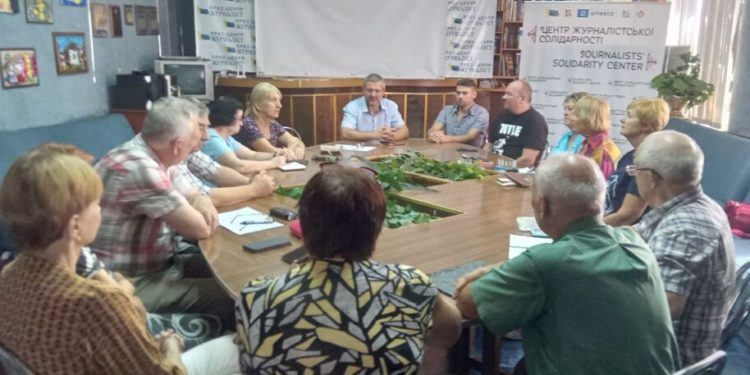
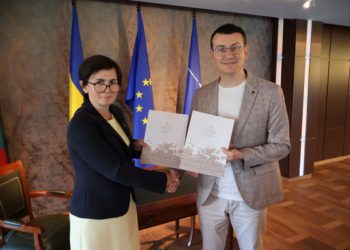
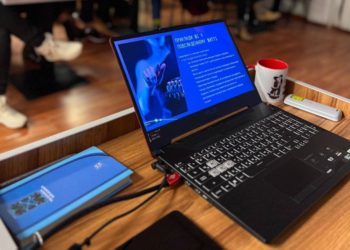


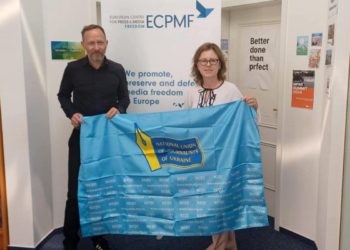











Discussion about this post